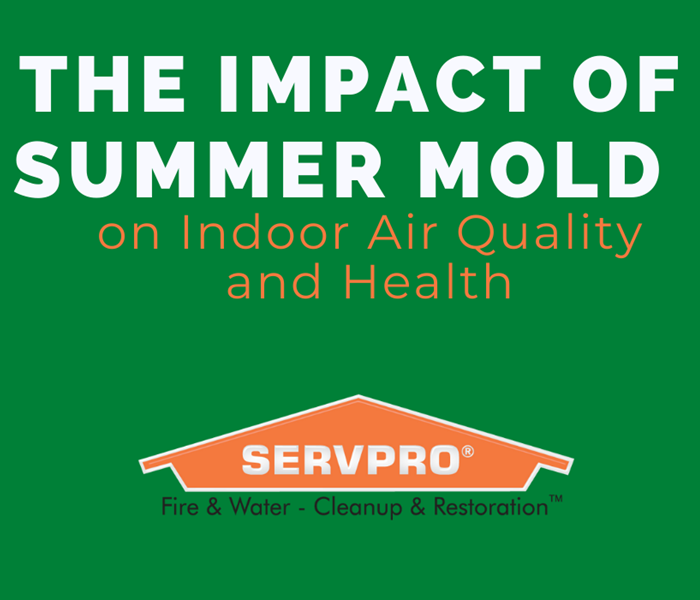The Impact of Summer Mold on Indoor Air Quality
7/16/2024 (Permalink)
 Regular maintenance, proper ventilation, and prompt action are key to maintaining a healthy indoor environment.
Regular maintenance, proper ventilation, and prompt action are key to maintaining a healthy indoor environment.
Summer brings warm weather and longer days, but it also increases the risk of mold growth in buildings. Mold not only damages structures but also poses significant health risks to occupants. Understanding how mold affects indoor air quality.
How Mold Affects Indoor Air Quality
- Release of Spores: Mold releases tiny spores into the air, which can be inhaled by occupants. These spores can trigger allergic reactions and respiratory issues, especially in individuals with preexisting conditions.
- Mycotoxins: Some types of mold produce mycotoxins, which are toxic substances that can contaminate the air. Exposure to mycotoxins can lead to more severe health problems, including neurological symptoms and immune system suppression.
- Odor: Mold growth often results in a musty odor, which can make indoor spaces unpleasant and indicate poor air quality. This odor can be persistent and difficult to eliminate without addressing the underlying mold issue.
Tips to Protect Indoor Air Quality
- Regular Cleaning: Keep your building clean and dry. Regularly clean surfaces prone to moisture, such as bathrooms and kitchens, with mold-inhibiting cleaners.
- Monitor Humidity Levels: Use hygrometers to monitor indoor humidity levels. Aim to keep humidity below 60% to prevent mold growth. Dehumidifiers can help control moisture levels.
- Improve Air Circulation: Ensure proper ventilation throughout the building. Use exhaust fans in high-moisture areas and open windows to improve air circulation.
- Address Water Issues Promptly: Fix any leaks and address water damage immediately. Dry out wet areas within 24-48 hours to prevent mold growth.
- Use Air Purifiers: Consider using air purifiers with HEPA filters to remove mold spores and other allergens from the air.
- Educate Occupants: Inform building occupants about the risks of mold and how to prevent it. Encourage them to report any signs of mold growth or water damage promptly.
Mold growth during the summer months can significantly impact indoor air quality. By understanding the risks and taking proactive measures to prevent mold, you can protect your building and its occupants from the harmful effects of mold exposure. Regular maintenance, proper ventilation, and prompt action are key to maintaining a healthy indoor environment.
Choose the #1 Experts in Cleanup and Restoration for Residential and Commercial Fire, Mold, Water, and Storm Damage. Contact us today! We can assist with your damage and restoration needs in Norfolk, MA.





 24/7 Emergency Service
24/7 Emergency Service